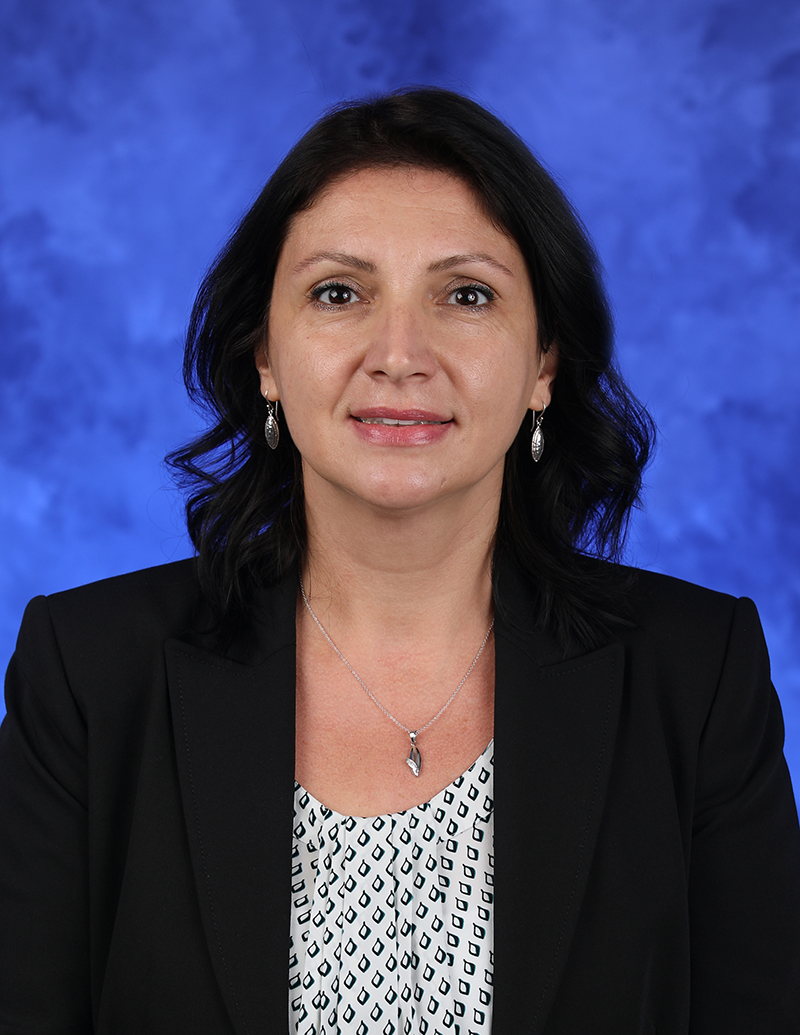College of Medicine faculty receive grants for cancer, addiction, community health research
Penn State College of Medicine researchers secured more than $15.3 million in grant funding from 110 awards during the months of October, November and December 2020. They will use the funds to study the role of genetics in causing disease, further develop a child abuse prevention online learning program and increase influenza vaccination in Hispanic communities.

Claudia Nicolae, PhD
The role of PARP10 in alleviating replication stress and promoting cellular proliferation and tumorigenesis
Investigator: Claudia Nicolae, PhD, assistant professor of biochemistry and molecular biology
Grant amount: $359,784 ($1,798,187 anticipated through January 2025)
Awarded by: National Cancer Institute
Goal: Nicolae will investigate how overexpression of a gene called PARP10 causes cancer cells to proliferate. By understanding the cellular mechanisms of how PARP10 promotes cancer growth, researchers could develop new, targeted cancer therapies.

Dajiang Liu, PhD, MA

Bibo Jiang, PhD, MA
Methods to identify, validate and interpret GWAS Loci in multi-ethnic meta-analysis
Investigators: Dajiang Liu, PhD, MA, associate professor of public health sciences and biochemistry and molecular biology teaching position; Bibo Jiang, PhD, MA, assistant professor of public health sciences
Grant amount: $518,091 ($575,657 anticipated through December 2021)
Awarded by: National Human Genome Research Institute
Goal: Many current genetic studies use samples from people with European ancestry. One focus of human genetics research in the next decade is to expand large-scale genetic studies to diverse human populations in order to empower genetic discovery and elucidate disease origins. Liu will collaborate with Jiang to develop powerful and computationally-efficient methods and apply them to a large scale multi-ethnic genetic study of smoking and drinking addiction, which is a major risk factor for diseases like cancer, cardiovascular disease and respiratory disorders.

Liza Rovniak, PhD, MPH

Christopher Sciamanna, MD, MPH
Integrating patient-centered exercise coaching into primary care to reduce fragility fracture
Investigators: Christopher Sciamanna, MD, MPH, professor of medicine and public health sciences; Liza Rovniak, PhD, MPH, associate professor of medicine and public health sciences
Grant amount: $491,758 ($13,950,066 anticipated through December 2021)
Awarded by: Patient-Centered Outcomes Research Institute
Goal: Rovniak will use supplemental funds to adjust an ongoing group exercise clinical trial for senior citizens to public health guidelines enacted during the COVID-19 pandemic. The program will pivot from a live, in-person exercise class to virtual exercise groups that use a home exercise DVD. Rovniak and Sciamanna will assess whether the virtual exercise groups can promote exercise and improve clinical outcomes in seniors and also examine the how local and regional levels of risk for COVID-19 exposure affect participants’ level of involvement in the program.

Benjamin Levi, MD, PhD
Head Start and iLookOut
Investigator: Benjamin Levi, MD, PhD, professor of humanities and pediatrics
Grant amount: $395,800
Awarded by: Eunice Kennedy Shriver National Institute of Child Health and Human Development
Goal: These funds support creating a new version of the iLookOut for Child Abuse online learning program that will be disseminated to Head Start programs nationwide. iLookOut has been shown to improve knowledge and attitudes about child abuse and reporting in both Pennsylvania and Maine, and will now help prepare Head Start staff to protect more than 950,000 infants, toddlers and pre-school aged children enrolled in Head Start programs in all U.S. states and territories. This initiative will collect new data on iLookOut’s effectiveness and establish a national standard for mandated reporter training.

Jennifer Kraschnewski, MD, MPH
Better Together: Enhancing Hispanic Health in Rural Pennsylvania through Healthy Lifestyle Strategies
Investigator: Jennifer Kraschnewski, MD, MPH, vice chair for research, Department of Medicine; professor of medicine, public health sciences and pediatrics
Grant amount: $182,832 ($2,376,979 anticipated through September 2023)
Awarded by: Centers for Disease Control and Prevention
Goal: This funding supports Penn State College of Medicine’s continued efforts to increase influenza vaccination in the Hispanic communities in Lebanon and Berks counties through the CDC REACH program which educates communities, trains community health workers and increases vaccination opportunities. Flu vaccination in this group is critical given that they are also disproportionately affected by COVID-19, at risk for serious illness from COVID-19 and are at high risk for flu infection.

Nikolay Dokholyan, PhD, MS
Nanoscale programming of cellular and physiological phenotypes
Investigator: Nikolay Dokholyan, PhD, MS, G. Thomas Passananti Professor and vice chair for research in the Department of Pharmacology; professor of biochemistry and molecular biology
Grant amount: $664,882 ($3,427,467 anticipated through December 2024)
Awarded by: National Institute of General Medical Sciences
Goal: This project seeks to design artificial proteins that respond to changes in pH and temperature in cellular environments, called nanoscale computing agents. The development of this technology may help researchers study biological systems in greater detail and lead to the development of precision therapeutics for disease.
Other awards
- See grant highlights from previous months here.
- See details on grants awarded to the College of Medicine from 2017 to present here.
If you're having trouble accessing this content, or would like it in another format, please email Penn State Health Marketing & Communications.
